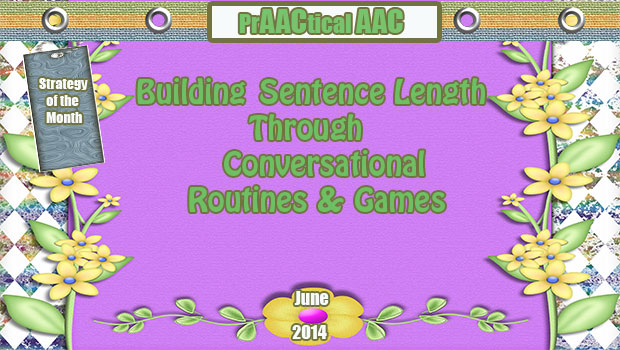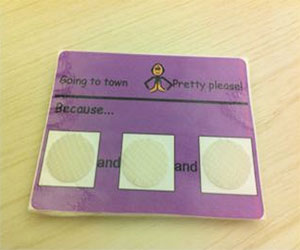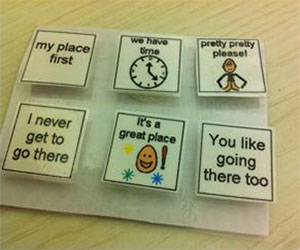Building Sentence Length through Conversational Routines & Games

Building sentence length beyond the simple sentence level can be a lot of fun for those of us who love language. Additionally, and even more important, expanded sentences can provide communication impact and power to the communicator. Expanded sentences usually means moving from the simple to complex sentence. As Carole mentioned last week, we often begin with conjunctions like ‘because’, ‘but’, ‘so’, ‘if’, before’, after’. Here are some ideas for conversational routines and games that allow for frequent repetition with variety as well as strong communication power that will help with making it worthwhile to use longer sentences.
- “Pretty Please” Routine- This routine involves using ‘because’ to negotiate with longer sentences. This routine is reserved for requests that are possible but not always honored. In the case of teaching, we start with requests that can be honored if “pretty please because I worked hard or some other reasonable reason is used. Begin with all reasons that make sense and then once the routine is learned (which is often quickly) a variety of appropriate vs inappropriate reasons can be used.
- “I Need it” Game– In this game/routine, gather related objects, puzzle pieces, or anything with multiple pieces. Then take turns saying “I need it SO I can ______”(match, finish put it together, etc). Then, the puzzle or blocks or scene can be constructed together but you only get to take your piece if you use the complete sentence. No-tech visual supports often support this game at the beginning but can be faded as appropriate.
- “Yes But After” Routine- In this routine/game, take turns giving each other commands and receive an answer of yes but…. after _________ (I finish this or It dries, or it is over, etc.). The idea is to have reasons why you can do the command but not right at the moment. This routine helps in a structured game but also helps in real life situations. It is important to prAACtice in both situations.
There are many more routines and games that can help build longer sentences. Use your imagination and think about the individual learner. Just remember to use teaching strategies like repetition with variety, lots of prAACtice, and aided language input.
Filed under: Strategy of the Month
This post was written by Robin Parker



2 Comments
I’m needing a program to help with severe word finding difficulty, I am 48, I’ve had since I was a child. Both my children have the disability, I will not communicate with people now as I can’t string a sentence together or tell a story. I’m am wondering if you can help me with a program to help me, I feel I have so much to give in my workplace but I am hold myself back from moving forward 🙁
Debbie, there are lots of things that might be helpful but the place to start would be to get a comprehensive evaluation by a speech-language pathologist. That will help her/him understand the exact nature of the issues you are having, which is important for designing an effective, research-based therapy program. This link to the American Speech-Language-Hearing Association site may be helpful in finding a qualified professional in your area if you are in the U.S.: http://www.asha.org/findpro/ . You’ve already taken a very positive step in making this comment. Way to go! Don’t give up on this journey, Debbie. You deserve to get the support you need to make your communication as effective as possible. Hang in there!